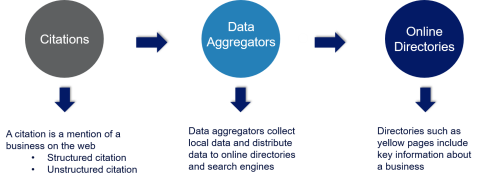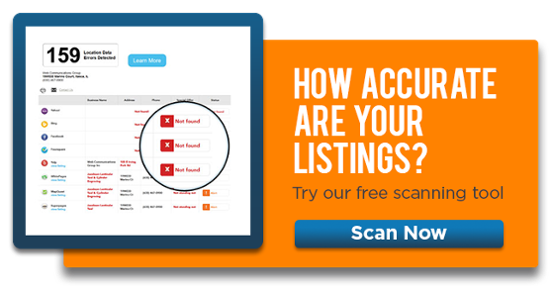Local search visibility can be improved by optimizing your local SEO, which includes syncing accurate business information with the many directories and sites out there that lists those businesses. Furthermore, it’s about working to increase your online visibility, particularly as it concerns local SEO marketing.
Aside from having your business info (name, address, phone number) displayed on a directory listing, reputation management and ongoing maintenance of your business info is crucial to establishing you as a credible business in the eyes of search engines.
Listing accuracy is vitally important. Inaccurate listings not only harm the business they’re for (if they’re active), but they can damage the trust Google has worked so diligently to foster between users and the search engine.
Moz Local’s George Freitag summed up listing accuracy nicely when he said:
Listing accuracy is Google’s method for determining whether Google can trust a local business result.
To obtain listing accuracy, Google relies on a number of places to find your information including phone directories and phone books, directories for specific sites, review websites, news websites, government websites, and more; and each time one of these locations mentions your business info, it increases Google’s confidence in the information you’ve provided.
Similarly, when a site or directory lists a variation of the details you’ve provided about your business—such as the wrong address or phone number, or an address/business name listed in a different format or variation—it decreases Google’s confidence in the validity of the business information, making it less likely to show your business in local results.
And why? Because Google wants to maintain the trust between its search engine and the users, since if too many users are dialing the wrong business number or trying to find businesses that don’t actually exist, people are less likely to trust Google’s results.
What’s worse is that if enough online sites provide contradictory information to what you’ve given for your business, that inaccurate information could override the details you’ve listed, forcing Google to trust these other sources more than your business. In the case of store hours or address, this can be a huge detriment to your business.

A breakdown of what you need to do to improve your local SEO visibility:
- Create your Google "My Business" listing.
- Find all of the variations and instances of your NAP (name, address, and phone number).
- Fix all instances of your NAP to reflect the correct business info you’ve provided in your Google My Business listing.
The real problem, as you can imagine, is finding every instance of your NAP and correcting it. This actually amounts to a tremendous amount of work, both searching for and correcting any aberrant mentions of your business. You might not have the know-how or time to do this work yourself, which is where a primary data provider comes in. We’ll talk about those after we get into your NAP.
Understanding the importance of your NAP and how it affects local SEO results
Providing your NAP by creating a Google “My Business” listing should be your first step, way before you dive into any kind of directory, review site, or phone book.
Before you start listing your information on other sites (citations), you need to find any and all existing NAP variations on the web and correct them for accuracy. Building local citations before you correct the NAP variations could create conflicting data for Google who may not trust that your business is legitimate, and may neglect to include it in local SEO marketing results.
Your business’ name, address, and phone number are important for a number of obvious reasons, from helping people get in touch with you and actually visiting your brick-and-mortar location, to making it easier for your audience to identify your brand.
For example, if your business is The Amazing Hotdog Factory, but you find variations for The Hotdog Factory, The Amazing Hotdog, and Amazing Factory of Hotdogs, people won’t know what to call your business, and Google will feel the same way.
To start searching for NAP variations, go to Google and start searching for your company name, your phone number, and parts of your address to see where your business info might be appearing. You can also do site: searches through Google, looking through specific sites for mentions of your NAP. If a website has a search function, you can also use that to search for duplicate/NAP variations.
Sound like a lot of work? It can be, but you also have the option to hire a third-party primary data provider capable of doing the work for you, and then some.
What a “Primary Data Provider” can do for your local search results
A primary data provider is someone you can go to and they will do the hard work of correcting your listing accuracy for you. Most providers have an extensive network of directories and listings they can search for mentions of your business info and then correct any inaccuracies should they come up.

The benefit to this is helping you establish that confidence in Google to trust the information you’ve provided. Once Google trusts your info, it feels confident enough to plug in your business info into local SEO results. Before you ask if that’s all it takes to fix the problem and cause you to appear more in relevant local SEO results, remember: sites change all of the time, and new ones are being created daily. Ensuring all citations—mentions of your NAP located on the web—remain consistent, a primary data provider will regularly check all sites in their network to maintain accuracy.
While they take care of the work of managing citation accuracy, a primary data provider may also put your business info on other sites you haven’t already appeared on, which is a benefit of the provider’s existing network. All of these extra sites that list the correct name, address, and phone number further increase Google’s confidence in your business’ legitimacy and it has a greater chance of appearing higher in local search results.
Optimizing local SEO contributes to better brand visibility and reputation
Another part of local SEO marketing is reputation management. This involves managing feedback, reviews, or comments left about your business or products on review sites such as Yelp or Angie’s List, as well as social media sites where your audience might be able to reach you. Reviews are often visible in local SEO results, and if you have reviews, comments, or questions not being addressed, it can be damaging for your business.
Local SEO marketing is sometimes neglected by businesses who think they can just rank well in Google and be seen by their target customer, but because Google actually differentiates global and local results, it can be a huge mistake to neglect this part of your optimization efforts. If you’re struggling to rank well in local results or can’t manage to correct all of the many NAP variations for your business, we also specialize in dealing with local SEO and business directory listings. Talk with our website design and SEO agency now.

